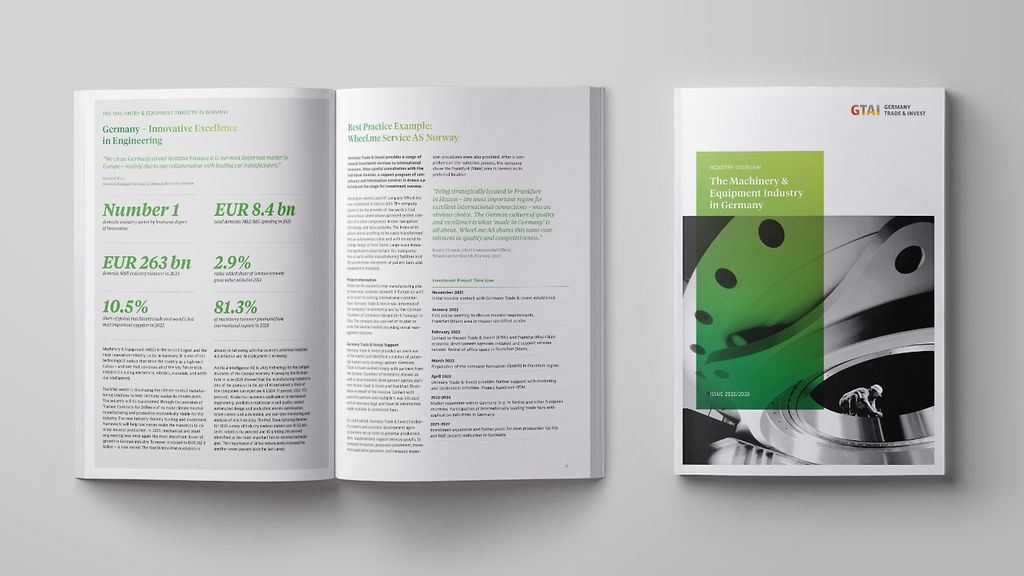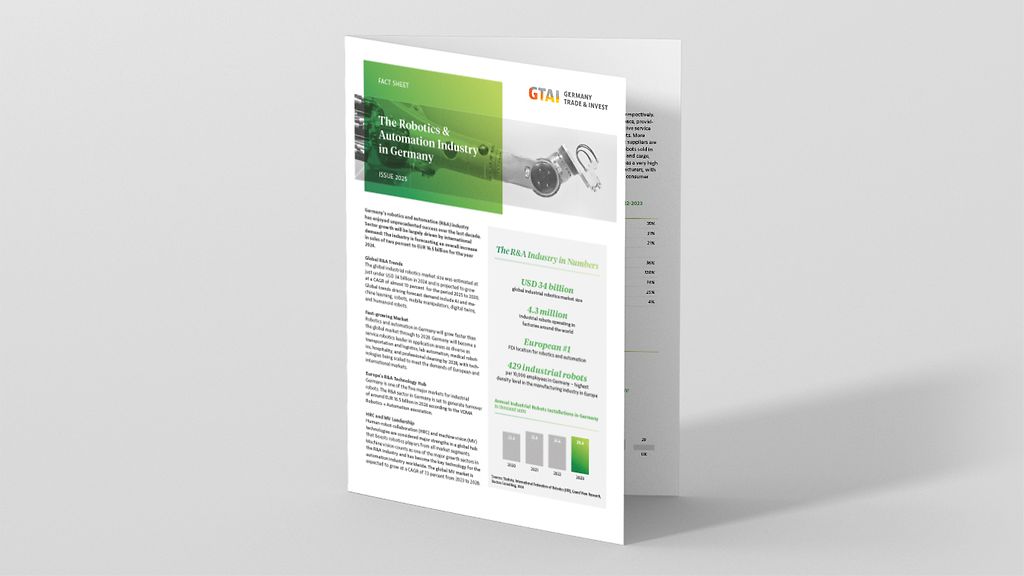revenue generated by German M&E sector in 2023
Your company is already operating in Germany and you would now like to export worldwide?
Key Facts
World’s Top M&E Manufacturer
Germany is in the top three leaders in 24 out of 31 M&E sectors. This underscores Germany’s engineering excellence and innovation in a highly competitive global industry.
Sustainability
The M&E sector is developing the climate-neutral manufacturing solutions to help Germany realize its climate goals. Industry will be transformed through the provision of “Carbon Contracts for Difference” to make climate-neutral manufacturing and production economically viable for industry. “There are no technology paths – whether in electricity and heat generation and use, in mobility or even the circular economy – that do not require components, machines and plants from the industry. As such, the M&E sector is the prime enabler for climate protection and resource efficiency.
Global Investment Magnet
Germany attracts around 25 percent of all M&E investment projects in Europe – making it the preferred destination for foreign direct investment in the sector.
Most Important Industry Sector
The M&E sector is Germany’s largest industrial employer, providing jobs to nearly one million people. With almost 90 percent of companies in the sector classified as SMEs, the industry plays a vital role in sustaining Germany’s economic strength.
High R&D Spending
In 2022, the sector invested EUR 10.3 billion in R&D. This significant investment drives advancements in automation, digitalization and energy efficiency, reinforcing Germany’s position at the forefront of industrial innovation.
Global And European Machinery Export Leader
In 2023, Germany's machinery export value reached an impressive EUR 66.8 billion, thereby confirming its role as one of the top exporters worldwide.
Opportunities
Germany is a leader in sustainability, with foreign companies and research institutes actively participating in innovative projects that drive the M&E sector's green advancements.
Value Chain Opportunities
Complete value chain coverage is a major driver of Germany’s M&E industry. Numerous research institutions, close proximity to key supplier industries – including electronics, robotics, materials, and software – and a strong industry base guarantee a pooling of resources of all actors within the value chain to promote innovation and R&D excellence. Service & maintenance and repair & overhaul are increasingly attractive due to their market size and growth potential.
Engineering Excellence
Germany’s rich tradition in mechanical engineering provides a foundation for continued global success. German universities and applied sciences institutions produce highly skilled professionals, with over 30 percent of graduates holding engineering or applied sciences degrees. The country’s renowned dual education system, which combines classroom and practical training, is uniquely tailored to industry needs – making it a model for global investors.
Innovation Clusters
Manufacturers located in Germany collaborate close with around 100 mechanical engineering university faculties and numerous internationally recognized research institutes.
The decentralized nature of Germany's M&E industry has allowed innovation clusters to develop strong science and industry networks. This has helped them secure an internationally leading position in various technology fields and consolidated their international benchmark status.
Germany’s industry cluster concept has created an environment in which operators from all sectors are able to flourish in proximity with other important actors.
Business Environment
Germany - The World's Leading Industrie 4.0 Nation
Germany has emerged as a global leader in Industrie 4.0 – advanced, networked production made in Germany. The country is recognized as a hub for digital manufacturing and innovation, offering international companies direct access to Europe’s largest manufacturing market and a robust R&D ecosystem.
Opportunities: Digitalizing German industry
Numerous industries are accelerating their digital transformation; integrating digital services to enhance productivity and develop new products. The Internet of Things (IoT) plays a key role, with applications in manufacturing, retail, transportation, and other sectors driving automation and delivering immediate benefits. Big data is also significant, with Germany being the fifth largest digital economy. It supports core industries like automotive, electrical, and chemical sectors, and the expansion of 5G networks is boosting further growth. By 2024, 80 percent of manufacturing companies plan to digitalize their value chains. Additive manufacturing, or 3D printing, is another promising market, with one in three large industrial companies in Germany using the technology.
R&D Support and Market Integration
Germany offers substantial research funding for Industrie 4.0 through national programs and the EU's Horizon Europe initiative. The widespread adoption of Industrie 4.0 technologies is evident – 62 percent of companies having already implemented digital solutions.
Industrie 4.0 Drivers
Automotive: Germany is a world-leading innovation hub. The sector also accounts for one third of the country’s industrial R&D investment spending.
ICT and Software: Germany’s ICT market is among the largest globally and an Industrie 4.0 solutions leader.
Machinery & Equipment: German manufacturers plan to invest EUR 10 billion annually into smart manufacturing technologies by 2025. This aligns with Germany's Industrie 4.0 goals.
Microelectronics: Germany is Europe’s top semiconductor producer, with plans to invest up to EUR 50 billion to strengthen its position.








